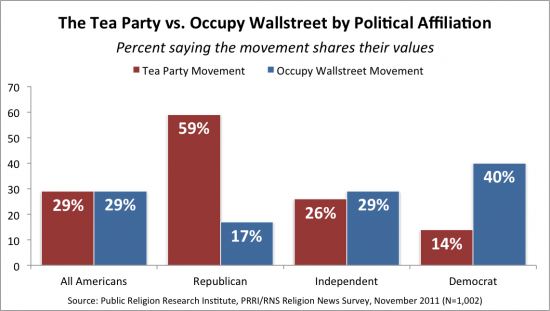Americans say Occupy Wall Street and Tea Party Movement Share their Values
I. American Values and The Tea Party, Occupy Wall Street Movements
Americans are equally likely to say that the Occupy Wall Street movement shares their values as to say the Tea Party movement shares their values (29% each). Americans also have nearly identical evaluations of the likely impact of each of these movements. For both the Tea Party movement and the Occupy Wall Street movement, about one-third of Americans say each movement is a good thing for society (32% each), 1-in-5 say each movement is a bad thing for society (19% and 18% respectively), and about 4-in-10 say each movement doesn’t matter one way or another (38% and 39% respectively).
Americans are deeply divided along partisan lines in their evaluations of these movements, although Republicans are significantly more likely to say the Tea Party shares their values than Democrats are to say the Occupy Wall Street movement shares their values. Approximately 6-in-10 (59%) of Republicans say the Tea Party shares their values, compared on only 14% of Democrats; 78% of Democrats say the Tea Party does not share their values. Only 4-in-10 (40%) Democrats say the Occupy Wall Street movement shares their values, compared to 47% who say it does not share their values. Only 17% of Republicans say the Occupy Wall Street movement shares their values, compared to 71% who say it does not. Less than 3-in-10 Independents say either the Tea Party movement (26%) or the Occupy Wall Street movement (29%) shares their values. Americans who identify as political moderates, however, are more likely to say the Occupy Wall Street movement shares their values (33%) than to say the Tea Party movement shares their values (22%).
Among religious groups, white evangelical Protestants are the most likely to say that the Tea Party movement shares their values (49%), but nearly 4-in-10 (39%) say it does not. Nearly 4-in-10 (38%) of religiously unaffiliated Americans say the Occupy Wall Street movement shares their values, compared to 34% of minority Protestants, 30% of white mainline Protestants, 29% of Catholics, and only 18% of white evangelical Protestants.
Americans who are part of the Millennial generation (ages 18-29) are significantly more likely to say the Occupy Wall Street movement shares their values (34%) than to say the Tea Party movement shares their values (26%).
II. Inequality and the American Dream
Approximately 8-in-10 (79%) Americans believe the gap between the rich and the poor has gotten larger over the past 20 years, 14% believe it has stayed the same, and only 4% believe it has gotten smaller. There is broad agreement across political, religious, and other demographic categories on this point.
Americans, however, are more divided about the impact of this perceived rise in inequality on the idea of the American dream: that if you work hard, you’ll get ahead. A majority (56%) of Republicans believe the American Dream still holds true, while 39% say it once held true but does not any more, and only 4% believe it never held true. In contrast, only 36% of Democrats believe the American Dream still holds true, and a majority (56%) of Democrats believe the American dream was once true but is not any more; 6% believe it never held true.
There are also large divides by race, gender, and education level. Hispanics stand out as the most optimistic group: 52% of Hispanics say the American Dream still holds true, compared to 44% of whites and only 33% of black Americans. Nearly 6-in-10 (58%) black Americans say the American Dream once held true but not anymore. Men (50%) are significantly more likely than women (38%) to say the American Dream still holds true. Religious differences largely follow the pattern of racial differences.
III. Government and Church Responses to Economic Crisis
Two-thirds (67%) of Americans say the government should do more to reduce the gap between the rich and the poor, compared to 31% who disagree. There is a striking 40-point gap between Republicans and Democrats on this question. More than 8-in-10 (83%) Democrats agree that the government should do more to reduce the gap between the rich and the poor, compared to only 43% of Republicans; a majority (54%) of Republicans disagree. Independents’ attitudes mirror the general public.
Majorities of nearly every demographic group—including all major religious groups, age groups, and education groups—agree that the government should do more to reduce the gap between the rich and the poor.
Approximately two-thirds (66%) of the general population also say the government should do more to help students pay for college and pay off student loan debt. However, the public is also conflicted about the effect of government assistance programs; approximately 7-in-10 (71%) say poor people have become too dependent on government assistance programs.
Americans are evenly divided in their evaluations of the responses of churches and clergy to the economic crisis. Forty-six percent say churches and clergy have not provided enough moral leadership on the country’s most pressing economic problems, compared to 45% who disagree. With the exception of minority Protestants, all major religious groups are divided on this question. Sixty-four percent of minority Protestants agree that churches and clergy have not provided enough moral leadership on economic problems.
IV. Approaches to Cutting the Deficit
Nearly 7-in-10 (68%) of Americans say that in order to reduce the deficit, it’s fair to ask wealthier Americans to pay a greater percentage in taxes than the middle class or those less well off.
More than 8-in-10 (81%) Democrats and 68% of Independents agree that asking wealthier Americans to pay a greater percentage in taxes than others is fair. Republicans are nearly evenly divided on this question (50% agree, 49% disagree).
Majorities of nearly all other demographic groups, including all major religious groups, agree that it’s fair to ask wealthier Americans to pay a greater percentage in taxes than the middle class or those less well off.
When considering measures that would help reduce the nation’s budget deficit, Americans favor increasing taxes on Americans making at least $1 million dollars per year (69%) and eliminating tax breaks for large corporations (57%). There are large partisan divides on each of these questions, with Democrats and Independents strongly favoring these proposals and Republicans nearly evenly divided. Strong majorities of every major religious group favor both of these proposals.
Americans oppose cutting funding for the military (74%), cutting federal funding for social programs that help the poor (67%), and cutting federal funding for religious organizations that help the poor (66%). There are interesting divisions over cutting federal funding for programs that help the poor, depending on whether the funding is going to religious organizations. Nearly 7-in-10 (68%) Republicans oppose cutting federal funding to religious organizations helping the poor, but only 46% oppose cutting general federal funding to help the poor. Among Democrats, there is an opposite, though less pronounced, pattern: 83% oppose cutting general federal funding to help the poor, but only 66% oppose cutting federal funding to religious organizations to help the poor.
Recommended citation:
Jones, Robert P., and Daniel Cox. “Americans Say Occupy Wall Street and the Tea Party Movement Share Their Values.” PRRI. 2011. Retrieved from http://www.prri.org/research/november-2011-rns/.






